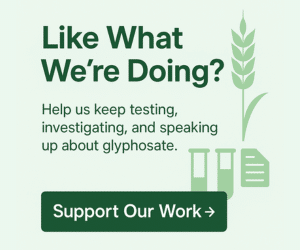What did we do before Roundup?
Before glyphosate became the go-to solution for weed management, farmers and gardeners relied on a variety of methods and natural substances. So why have we become so dependent on this one chemical?
In the face of MPI’s proposal to increase allowable glyphosate levels, it’s time to challenge our assumptions about weed control. Why has glyphosate become synonymous with modern agriculture, and are we truly without alternatives?
It’s time to question why we’ve allowed a single chemical to dominate our food production and explore the alternatives, both from the past and the present.
The Pre-Roundup Era — How Did We Manage?
Glyphosate was introduced in the 1970s, but before that, farmers and gardeners used a range of other methods.
- Mechanical Weed Control: Traditional methods like hand-pulling, hoeing, and tilling were labor-intensive but effective. These practices encouraged a deeper connection with the land.
- Crop Rotation: Rotating crops to prevent weed dominance was a fundamental principle. Different plants were sown to outcompete weeds naturally.
- Natural Suppressants: Substances like vinegar, boiling water, and organic herbicides (like those made from essential oils) were used to suppress weeds without harming the soil.
Reflection: Were these methods truly less efficient, or did we simply prioritize convenience over sustainability when glyphosate entered the market?
Modern Alternatives — Are We Stuck on Glyphosate?
Innovations in Weed Management:
- Biological Solutions: Cover cropping, mulching, and maintaining soil health naturally suppress weed growth by enhancing soil biodiversity.
- Non-Chemical Herbicides: Products made from citric acid, pelargonic acid, and other organic compounds are increasingly available and effective for targeted applications.
- Integrated Weed Management (IWM): Combining biological, cultural, mechanical, and minimal chemical methods to achieve long-term weed control.
Corporate Strategy Shift: Bayer’s Move Away from Glyphosate in Residential Products.
In response to legal pressures and public health concerns, Bayer announced the removal of glyphosate from Roundup for the U.S. consumer market in 2023. The replacement formula uses alternative active ingredients, but it’s unclear if these are any safer or more effective.
Some farmers report that the new formulation is less effective than the original, leading to frustration and doubts about whether the change actually benefits consumers. Did Bayer sacrifice product performance just to appease regulators? And are consumers truly safer, or just left with a less effective product?
Why the Reluctance to Change?
Economic Ties: The agricultural industry’s economic entanglement with glyphosate is significant. Bayer’s influence and the costs of transitioning to other methods keep glyphosate entrenched.
Cultural Norms: For decades, glyphosate has been marketed as the most efficient and effective solution. Changing perceptions is a challenge.
Perceived Efficiency: Glyphosate is fast and relatively cheap, making it a tempting choice. However, long-term soil degradation and resistance issues suggest the opposite.
A Mindset Shift — Breaking Free from Glyphosate Dependence
We’ve become conditioned to believe that glyphosate is indispensable. But what if we questioned that assumption? If farmers can transition in countries where restrictions are stricter, why can’t we?
Highlight: Innovative farmers who have moved away from glyphosate-based practices often report improved soil health and resilience against weeds. Can their success stories inspire a larger movement?
Call to Action: Let’s support policies and practices that promote sustainable and safe alternatives. We don’t have to wait for regulation to force our hand; proactive change is within reach.
Conclusion: Are We Ready to Think Differently?
If Bayer can remove glyphosate from Roundup in the US, why can’t we in New Zealand? However, it’s important to question whether replacing glyphosate with potentially harmful alternatives truly solves the problem. Instead of swapping one risk for another, we should be focusing on innovative, sustainable weed management practices.
This isn’t just about banning one chemical but transforming our entire approach to agriculture. We must challenge the narrative that glyphosate is the only practical solution and champion innovation over stagnation.
Final Thought
Are we ready to challenge the status quo and invest in more sustainable, community-driven practices? What if we stopped assuming glyphosate is essential and started exploring better ways forward?
Resources & References
This section is not an exhaustive list, but rather a starting point for further exploration. The resources gathered here offer insights into alternatives to glyphosate, sustainable farming practices, and the ongoing debate about glyphosate’s safety. Use these references as a foundation to dig deeper, question the prevailing narratives, and challenge the assumption that glyphosate is indispensable.
Studies on Non-Glyphosate Weed Management
Farming Without Glyphosate?
This study explores alternative weed control methods, including bioherbicides and crop rotations, emphasizing the need for diversified weed management strategies.
Read the study
Weed Management: Alternatives to the Use of Glyphosate
A comprehensive report detailing various non-chemical weed management practices suitable for both conventional and organic farming systems.
View the report
Reports on Bayer’s Non-Glyphosate Formulations
Bayer to Pull Roundup from Shelves in 2023 to Avoid Further Lawsuits
An article discussing Bayer’s decision to remove glyphosate-based Roundup from U.S. residential markets due to legal challenges.
Read more
Bayer’s Full Court Press to End Glyphosate Lawsuits Heats Up
This piece examines Bayer’s legal strategies to mitigate ongoing litigation related to glyphosate.
Explore the article
Articles on Pre-Glyphosate Weed Control Practices
Organic Methods for Killing Weeds Safely
An informative guide on traditional and organic weed control methods used before the advent of glyphosate.
Learn more
Books
The following books are linked to Amazon.com for your convenience. If you decide to purchase through these links, we may earn a small commission — at no extra cost to you.
The Organic Gardener’s Handbook of Natural Insect and Disease Control [amazon.com]
By Barbara W. Ellis and Fern Marshall Bradley.
A comprehensive resource on organic gardening practices.
The Soil Will Save Us [Amazon.com]
By Kristin Ohlson. This book emphasizes the importance of sustainable soil health as a natural weed suppressant.
YouTube Clips
Organic Herbicides for Farming | Natural Weed Killer (Weedicides)
A video discussing various organic herbicides and their applications in farming.
Watch the video
The conversation about glyphosate alternatives and sustainable agriculture is ongoing and evolving. Keep questioning, keep researching, and most importantly, keep pushing for change. The more we know, the better equipped we are to advocate for safer and more resilient food systems.
Image Source & Attribution
We’re grateful to the talented photographers and designers whose work enhances our content. The feature image on this page is by vitaliyborkovskiy. You can find more of their work here: https://www.123rf.com/profile_vitaliyborkovskiy.




